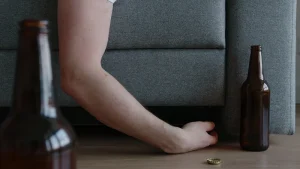
When you’re working to quit drinking, writing can help you come to terms with and realize things about your relationship with alcohol that you didn’t know before. The sudden lack of alcohol in your system can send your body into withdrawal, resulting in various symptoms. A doctor can assess whether your body can safely manage the withdrawal process or if you’ll need medical monitoring and assistance. Simply being here, reading tips on how to quit drinking, considering the possibilities of your future is a positive first step. Let’s get you even closer to finding new hope and life in sobriety.
- Set a daily message alert on your phone for moments when you know you’ll crave a drink the most.
- Letting others know about your choice to stop drinking may help motivate you to stick with your decision.
- With less alcohol in your life, you’re likely to have clearer skin, better sleep, and you may see a boost in your overall mood.
- It can be helpful to make a plan ahead of time for how to handle a relapse.
Hot weather hikes: Staying safe when temperatures spike
One thing that has kept me sober is that I no longer wanted to be the person I was as a drinker. I’m not just referring to how I behaved while under the influence, but my general demeanor, reputation, and options for life were all begging for a massive change. Going from a life of drinking to a life in recovery from alcoholism can be challenging. You also need a reason that will help keep you from having relapses, dealing with withdrawal, and staying committed to your goal of sobriety. Once this was no longer an option, I started to write instead.
Make a plan for when cravings kick in.

Thankfully, you can equip yourself with tools and resources to prevent relapse (and get back on track should it occur). Drinking mocktails and nonalcoholic beer is another way https://ecosoberhouse.com/ you can abstain without calling attention to yourself, Koob says. If you’re struggling with the social dynamics of cutting back, Koob recommends having a good excuse on hand.

How to Know When It’s Time to Cut Back
You may want to take a family member or friend along, if possible. Alcohol causes changes in your brain that make it How to Stop Drinking hard to quit. Trying to tough it out on your own can be like trying to cure appendicitis with cheerful thoughts.
Team GB have medal downgraded to bronze after race ended in dramatic scenes
When you’re having a good time, you find it hard to stop, especially in the company of friends having the same amount. To stop drinking alcohol, you first need to understand your relationship with drinking. From there, you may need social support, consistent self-care, and new routines that can help redirect your mind. It’s recommended to drink no more than 14 units of alcohol a week, spread across 3 days or more.
Thinking of trying Dry January? Steps for success
- You can also set a few days of the week as alcohol-free days.
- And some, like those who are pregnant, should not drink at all, he says.
- In theory, setting one big giant goal of “never drinking again” makes sense.
- Her fields of interest include Japanese translation, cooking, natural sciences, sex positivity, and mental health, along with books, books, and more books.
- Join a gym, learn a new skill, or find sober social groups you can enjoy.
You don’t need to be diagnosed with alcohol use disorder in order to quit drinking. If alcohol is interfering with your health or your personal, financial, or professional life, consider quitting. This article discusses alcohol withdrawal, its symptoms, and potential complications. It also provides an overview of the alcohol withdrawal timeline process and when to discuss your drinking with your healthcare provider. If you drink in excess, cutting out alcohol for a period of time can help your liver, heart, and body composition. The third way to prepare for quitting is to build your support system.
Stay present
- If you identify with any of the scenarios above, try the expert tips below for reducing your alcohol consumption (or even eliminating it altogether).
- When you feel a craving coming on, assess what’s around you and what you’re feeling.
- But if you’re living with alcohol use disorder, drinking is more than a habit.
- Those with a wider circle of support have a better chance of staying sober.
- As your mind and body try to tell you that you need another drink, understanding what’s at the root of that thought or feeling is key in reaching a healthier state of sobriety.
- The federal government’s Dietary Guidelines for Americans recommends not drinking at all, but suggests that if you do, keep it under two drinks a day for men and one for women.
Many people who reduce their alcohol intake notice benefits, which can include those below. Being involved in rounds makes it easy to end up drinking more than you meant. Try to avoid them if you can, and do not feel like you have to say yes to a drink just because someone else is buying. As a rule of thumb, white and rosé wines are lower in strength than reds. Or try swapping some or all of your drinks for no or low-alcohol alternatives. One simple way to cut down is to have at least a few drink-free days every week, so choose yours and get practical support to stick with it.
Mental Health Services
If you try one method and it doesn’t work, don’t lose hope. There are effective treatment approaches that can help you quit, so talk to your doctor or a mental health professional if you need more help finding options that will work for you. Common alcohol withdrawal symptoms can include nausea, shaking, and sweating—which can be unpleasant or even dangerous. In order to quit drinking, you may need proper medical support to detox safely. To prevent symptoms of alcohol withdrawal from worsening, people need to stay in a controlled and calm environment.

